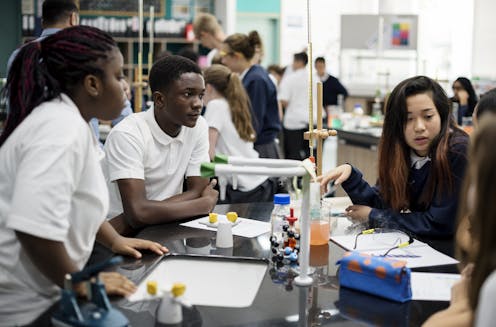All teachers need to teach language and literacy, not just English teachers
- Written by Sue Ollerhead, Senior Lecturer: Language and Literacy Education, Macquarie University

Proposed changes[1] to the New South Wales English syllabus reinforce the misguided idea that the teaching of language and literacy skills should fall chiefly to English teachers, leaving other teachers to focus more on their subject content.
The plan follows a report[2] by the NSW Education Authority (NESA) that found students’ writing standards had fallen sharply over recent years.
The draft NSW English syllabus[3] includes specific language and literacy outcomes[4] such as grammar, punctuation, paragraphing and sentence structure, unlike the draft NSW maths syllabus[5] which has no specific language outcomes.
The Sydney Morning Herald reported[6] the English Teachers Association said the changes “would hand them an unnecessary burden because literacy skills differ from subject to subject.”
Linking language and literacy outcomes to the English syllabus in an attempt to improve students’ writing across all subjects is a flawed approach.
It ignores important research on what all teachers need to know about language and gets in the way of students developing the different language skills[7] they need in different subjects. It also risks disadvantaging students who are still learning English.
Read more: STEM education in primary schools will fall flat unless serious issues are addressed[8]
How does language work differently in different subject areas?
Rather than learning lists of vocabulary or abstract grammar rules, students learn best when they get actively involved in their classroom learning.
This means using many different language skills, such as listening to teachers’ explanations, taking notes and developing written arguments.
But not all of these language skills can be transferred to different subjects in the same way.
Take science, for example.
We often think of it as a practical, hands-on subject rather than one focused on reading and writing. But students also need to read scientific explanations and write scientific reports. They also need to use complex language skills to explain, present and test scientific ideas.
Skilled science teachers[9] understand and plan for those bits of scientific language that students find difficult.
Confusion can arise when a word that means one thing in everyday language means quite another thing in science – like “culture”, when we mean to grow bacteria or cells, or “medium”, when we mean the liquid that bacteria or cells grow in.
Students also need to know that in science, unlike in English, the subject of the sentence is not as important as the concept or process we are talking about.
So instead of saying, “we saw the water droplets”, we would often say “water droplets were observed”.
We also tend to use more economical language in science than in the English classroom.
So, it’s a “saltwater solution” rather than “a liquid solution with salt in it” and “condensation” rather than “that thing that happens when water condenses”.
We can’t expect English teachers to anticipate these science-specific language challenges.
Maths is also often thought of as a “language-free” subject, even though language is essential for understanding and communicating maths[10].
But mathematical language is best taught in the context of doing maths. Some everyday words such as “product” and “domain” mean something quite different in maths, while different terms like “times” and “multiply” mean the same thing. This can be challenging when English is not your first language.
What about students who don’t speak English as a first language?
In NSW schools, 24% of students speak English as an additional language[11]. They have to learn multiple facts, figures and skills in a language that they are still learning.
They need their teachers to be able to understand their language challenges and to give them subject-specific language support[12] so they can succeed at school like everyone else.
Yet, many teachers say they don’t feel well prepared to teach English language learners. Teachers need to have professional development opportunities[13] available to make sure they are supported to meet the challenges they face in the classroom.
Read more: Language matters in science and mathematics - here’s why[14]
What does the research say?
Researchers[15] argue[16] that because all learning involves language, language and literacy should[17] be taught explicitly across all school subjects. Language must be understood and learned in context[18], not outsourced to English teachers and taught as generic “skills”.
If we want to improve the writing of all students, we need to give them lots of practice in using different vocabulary, grammar and text structures in their different school subjects. Then they can learn language at the same time as they are learning about new concepts and contexts.
This is particularly important for students who are new to English. Simply dropping them in an all-English learning environment or giving them simplified English will not work.
In Australia, the language challenges faced by students from different backgrounds are all too often invisible to teachers. We need this to change.
If we are serious about making education fair and inclusive, then all subject teachers should share responsibility for teaching language.
References
- ^ Proposed changes (www.educationstandards.nsw.edu.au)
- ^ a report (www.smh.com.au)
- ^ NSW English syllabus (www.educationstandards.nsw.edu.au)
- ^ specific language and literacy outcomes (www.smh.com.au)
- ^ NSW maths syllabus (educationstandards.nsw.edu.au)
- ^ reported (www.smh.com.au)
- ^ different language skills (www.education.vic.gov.au)
- ^ STEM education in primary schools will fall flat unless serious issues are addressed (theconversation.com)
- ^ science teachers (www.scmp.com)
- ^ understanding and communicating maths (research.acer.edu.au)
- ^ English as an additional language (education.nsw.gov.au)
- ^ subject-specific language support (education.nsw.gov.au)
- ^ professional development opportunities (education.nsw.gov.au)
- ^ Language matters in science and mathematics - here’s why (theconversation.com)
- ^ Researchers (www.wested.org)
- ^ argue (ro.uow.edu.au)
- ^ should (www.heinemann.com)
- ^ in context (www.petaa.edu.au)













